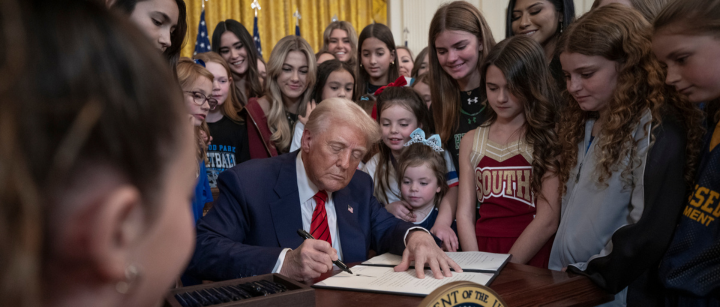Listen to the article
Trump Administration Redefines Civil Rights Division’s Mission with Anti-DEI Focus
The Justice Department under President Trump has dramatically shifted its civil rights enforcement priorities, targeting diversity, equity, and inclusion (DEI) programs that the administration now characterizes as “unlawful discrimination.” The change represents a stark departure from traditional civil rights enforcement and has triggered a mass exodus of career staff from the department’s Civil Rights Division.
In his first days back in office, Trump issued executive orders directing federal agencies to eliminate what he termed “illegal and immoral” DEI initiatives throughout government. The orders also instructed agencies to “combat illegal private-sector DEI preferences, mandates, policies, programs, and activities.”
The administration’s approach closely mirrors recommendations outlined in Project 2025, the controversial conservative policy blueprint. Project 2025 specifically called for eliminating DEI programs throughout government and preventing such practices in the private sector, labeling them as discriminatory. The document urged the Department of Justice to “lead a whole-of-government recommitment to nondiscrimination” at federal, state, local and private-sector levels.
Attorney General Pam Bondi wasted no time implementing this vision. On February 5, her first day in office, Bondi directed the Civil Rights Division to develop a plan “to encourage the private sector to end illegal discrimination and preferences, including policies relating to DEI and DEIA.”
By May, the DOJ launched a “Civil Rights Fraud Initiative” co-led by the Civil Rights Division. Deputy Attorney General Todd Blanche announced the department would use the False Claims Act against federal fund recipients who “certify compliance with civil rights laws while knowingly engaging in racist preferences, mandates, policies, programs, and activities, including through diversity, equity, and inclusion (DEI) programs.”
This redirection represents a profound change for the Civil Rights Division, which was established by the Civil Rights Act of 1957. Historically, the division has focused on protecting Black voting rights, prosecuting crimes against civil rights activists, and enforcing laws against discriminatory housing practices.
The impact on staffing has been severe. According to Government Executive, the division has lost more than 60% of its workforce since January, shedding hundreds of employees.
“The realization sort of slowly dawned on people that there was no interest from this administration in enforcing civil rights laws,” Katie Chamblee-Ryan, a former attorney in the Justice Department’s Civil Rights Division, told MSNBC. “And, not only that, they were going to weaponize those same laws against the very people they were designed to protect.”
While the administration has not yet brought litigation against private companies for DEI practices, many businesses have proactively modified their diversity policies since Trump took office, apparently concerned about potential legal exposure.
At state and local levels, however, the Civil Rights Division has been more active. It opened investigations against the Hennepin County Attorney’s Office in Minnesota for adopting a policy requiring prosecutors to consider “racial identity” when negotiating plea deals. The division has also targeted Minnesota and Rhode Island for allegedly engaging in race-based discrimination in employment practices.
Chicago Mayor Brandon Johnson has also come under scrutiny after the Civil Rights Division opened an investigation into the city’s hiring practices. The investigation followed Johnson’s remarks at a church where he boasted that his administration is the “most diverse” in city history, which the division interpreted as suggesting hiring decisions were made “solely on the basis of race.”
These enforcement actions highlight the dramatic policy reversal underway. Whereas DEI policies have been widely adopted across both public and private sectors in recent years as tools to provide “equal access to opportunities” and create a “sense of belonging,” according to the Harvard Business School’s definition, the current administration views them as discriminatory practices that violate civil rights laws.
The reorientation of the Justice Department’s Civil Rights Division represents one of the most significant policy shifts of the Trump administration’s second term, transforming a division once focused on protecting marginalized groups into an enforcement mechanism against diversity initiatives.
Fact Checker
Verify the accuracy of this article using The Disinformation Commission analysis and real-time sources.




9 Comments
Interesting read on the Trump administration’s shift in civil rights enforcement priorities. Seems like a major policy change that could have significant implications, both in government and the private sector.
I’m curious to see how this plays out in practice and what the broader impacts will be. Definitely an issue that will likely be closely watched and debated.
The article highlights the administration’s efforts to combat DEI programs, which they view as discriminatory. This appears to be a stark departure from traditional civil rights enforcement approaches.
It will be important to closely monitor how this shift affects employment, education, and other areas where DEI initiatives have been implemented.
The administration’s stance on DEI programs, as outlined in Project 2025, seems to be a key part of their broader cultural and political agenda. This could have far-reaching implications for a range of sectors and institutions.
The mass exodus of career staff from the DOJ’s Civil Rights Division is quite concerning and suggests significant turmoil within the department. This shakeup could undermine the effectiveness of civil rights enforcement going forward.
It’s interesting to see the administration characterize DEI programs as “unlawful discrimination.” This framing seems to be a marked departure from how such initiatives have been viewed in the past.
The legal and policy battles over these issues are likely to continue, with significant stakes for employers, educators, and the broader public.
This article highlights the cultural and political tensions surrounding the Trump administration’s approach to civil rights and DEI. It will be important to follow how these debates evolve and impact various sectors of society.